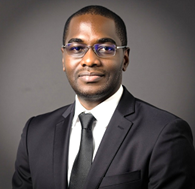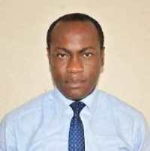CAMEROON PROJECT PORTFOLIO MANAGEMENT
LANDSCAPE
Interview with Dr Samuel SALLA, PMP®
President of PMI chapter Cameroon

Interviewed by Martin Madiba Ebongue
International Correspondent, PM World Journal
Cameroon and Central Africa region
Introduction to the interviewee
Samuel Salla is an accomplished professional, uniquely adept in both Project and Financial Management, complemented by over 12 years as an experienced trainer. He champions the critical integration of these disciplines as fundamental drivers for sustainable development, particularly within challenging contexts like Cameroon.
His practical expertise shines across several complex projects, notably a $37 million USAID-funded initiative. Within this particular program, he ensured robust project operations management and crucially strengthened the governance mechanisms of over 25 local organizations. This remarkable feat directly ensured the uninterrupted provision of vital services to over 35,000 orphans and vulnerable children, showcasing his ability to solve complex systemic issues through rigorous project and financial oversight.
Beyond execution, Samuel has personally coached, trained, and mentored over 3,000 students and young professionals, delivering impactful training in finance, audit, and project management. As President of the PMI Cameroon Chapter and a PMI University Outreach Ambassador, he actively shares expertise, emphasizing how robust financial governance and disciplined project execution are crucial for overcoming development hurdles in Cameroon.
In January 2024, Samuel assumed leadership as PMI Cameroon Chapter President, guiding a group of seven Vice Presidents and serving thousands of project enthusiasts. He’s instrumental in driving impactful initiatives at both national and community levels, leveraging effective project management to foster development across Cameroon. Through these efforts, he directly contributes to empowering women (SDG 5), providing high-quality education in project management (SDG 4), and building strong, collaborative partnerships for sustainable development (SDG 17).
Interview
Q1: Can you share with us the story of Project Portfolio Management in Cameroon in 5 steps?
Samuel: The concept of Project Portfolio Management was not born in Cameroon but was imported by multinational corporations and international development organizations like the World Bank and UN agencies. Operating with global mandates, they had to align local projects with their worldwide strategies. They introduced basic PPM principles—like formal project selection and strategic alignment—to manage their large-scale initiatives in sectors such as oil, infrastructure, and public health. This initial phase was fragmented, with PPM seen as a niche, externally imposed practice rather than a local business discipline.
As Cameroon’s private sector began to grow in the 2000s, particularly in telecommunications, banking, and construction, there was a quiet, grassroots recognition of the need for better project governance. Companies started to lose money on misaligned projects and inefficient resource use. This led to a gradual, informal adoption of PPM concepts, often driven by the experience of project managers who had worked for international firms. Professional bodies, such as the PMI Cameroon Chapter, played a pivotal role in this phase by organizing workshops and advocating for formal project management practices, laying the groundwork for a more structured approach.
This period marked a significant shift from informal practices to structured frameworks. Local companies began to actively seek out professionals with certifications like PMP and Prince2, and the focus moved from simply completing projects to ensuring they delivered strategic value. This was the era of standardization, where organizations built formal project management offices (PMOs) and adopted standardized processes for project selection, prioritization, and tracking. This shift was fueled by a desire to reduce project failures and enhance organizational transparency.
Today, PPM is no longer just a corporate tool; it is a key enabler for national development. The government and public sector are increasingly recognizing its importance in achieving the ambitious goals outlined in the National Development Strategy 2030 (SND30). PPM is seen as a way to ensure that major public projects in sectors like infrastructure, energy, and digital transformation are not only executed efficiently but also contribute directly to national priorities, maximizing return on public investment.
More…
To read entire interview, click here
How to cite this work: Madiba Ebongue, M. (2025). Cameroon Project Portfolio Management Landscape, Interview with Dr. Samuel Salla, PM World Journal, Vol. XIV, Issue IX, September. Available online at https://pmworldlibrary.net/wp-content/uploads/2025/09/pmwj156-Sep2025-Madiba-Egongue-Interview-with-Samuel-Salla.pdf
About the interviewer

Martin MENGU MADIBA EBONGUE
Correspondent for Cameroon & Central Africa Region
Douala, Cameroon
![]()
Martin Madiba Ebongue, MscPM, PMP® is a dedicated and passionate Senior Project, Programme and Portfolio Management Professional with a demonstrated track record across Africa for 20+ valuable years of experience in the fields of Aviation, Government and Non-Government, Banking, Agribusiness, High tech, Energy and Construction.
He is holder of a Master’s degree in Project Management (Pan African Institute of Development-Central Africa); a Post Graduate Certificate in Project Management (University of Wales-United Kingdom); a Project Management Professional (PMP®) Certification (Project Management Institute-USA); Quality Systems Specialist ISO9001V2015 and Lead Auditor 19011 trained by Bureau Veritas.
In the Agribusiness and development field, he holds University Diploma in Science and a Graduate Certificate in Agriculture-Economics (National School of Agronomy and agricultural science Dschang-Cameroon).
In Aviation, he is also a Senior Airline Safety Officer trained by the Institut Français de Securité Aérienne-Paris, a Certified Professional in Aviation Safety/Security from National Advanced School of Civil Aviation-Paris and holds a Diploma in Airline Strategy Management (IATA) Institute of Training and Development–Switzerland.
He’s had a multifold career pattern as Guest Lecturer for master’s degree classes in Project Management and Strategy for Business Schools, Corporate Trainer for Small, medium size firms and multinationals, Senior Business & Project Management Consultant, and several Senior Advisory roles particularly in West Africa. He served as Program Coordinator and Project Manager, Director for Strategy and Projects for several organisations in different sectors.
Since 2019 Madiba has been hired by the National Airline Project: Cameroon Airlines Corporation, as Company Secretary to the Board, cumulatively as Chief Commercial Officer. In this current role, he is involved in corporate gouvernance, program and portfolio management, high level negotiation with government and strategic stakeholders including bilaterals, building alliances, product development, airline Network modeling, distribution and sales strategy. He is currently successfully implementing an end-to-end commercial Project Management Office (PMO) with outstanding results.
In 2010, MADIBA was among the pioneer volunteers in the creation of PMI Cameroon Chapter. Over the years, he has coached 200+ candidates gathered in study groups across Africa preparing for the PMI-PMP Certification. He has authored several articles from his project engineering experience and research that have been published in national and international journals with worldwide read reviews notably “PM Today” edited by the Project Management Institute –USA. Also, he has been a prominent speaker in regional events in Douala-2012; Lagos-2013; Lome-2015; Abidjan-2016: Douala-2019 and PMI Africa Conferences in Johannesburg; Mauritius-2021.
Since March 2024, Madiba has served as an International Correspondent for the PM World Journal and Library, covering Cameroon and other countries of the Central African sub-region.
He can be contacted at martinebongue07@gmail.com









